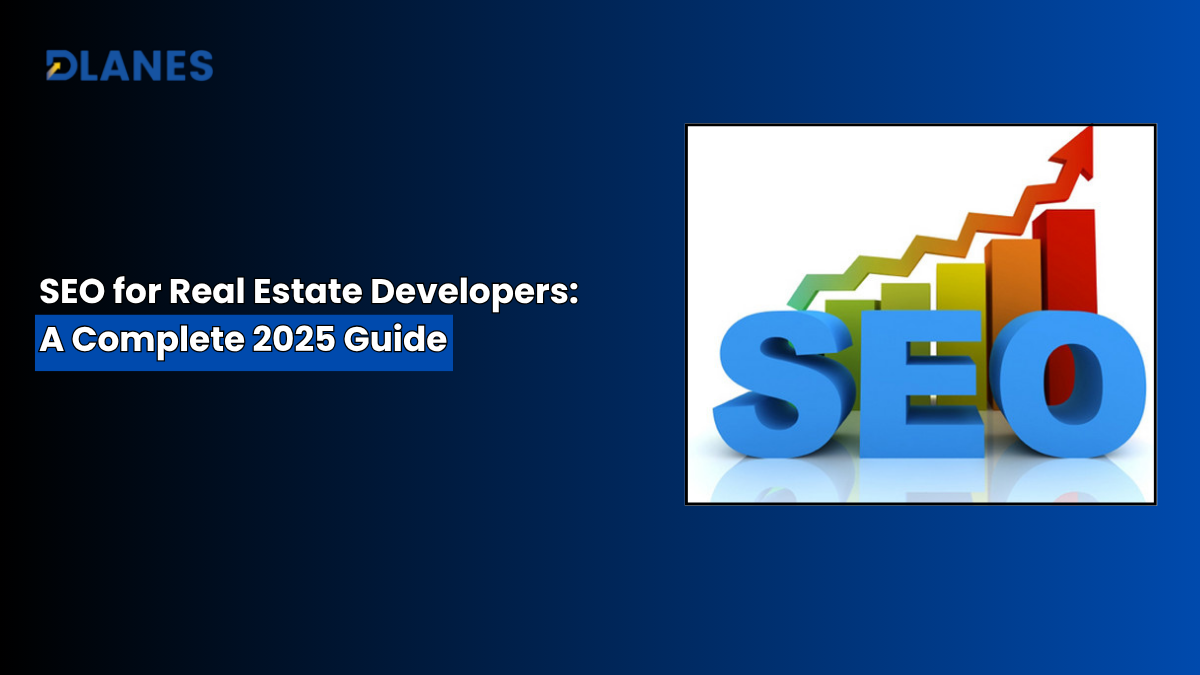SEO for Real Estate Developers: A Complete 2025 Guide

Table of Contents
Introduction
In 2025, every serious homebuyer starts their search on Google. They’re not flipping through newspapers or waiting for a billboard. They’re typing “2BHK near Medavakkam under 50 lakhs” or “approved DTCP plots near Sarjapur Road.” If your project isn’t showing up, you’re losing real, ready-to-buy leads.
That’s why SEO (Search Engine Optimization) is no longer optional for real estate developers. It’s the smartest way to attract high-intent, organic traffic to your site — without burning cash on ads every day.
This guide will show you exactly how to use SEO to grow visibility, build trust, and bring in quality leads month after month.
Why SEO Matters in Real Estate
Paid ads are great, but they stop working the moment you pause your budget. SEO is different. Once you rank, you stay visible. You show up when people search. And you do it without paying per click.
For real estate developers, SEO builds long-term brand value. It drives serious traffic, improves credibility, and works silently in the background — helping you get discovered by buyers at the right time.
1. Choose the Right Keywords for Buyers
Everything starts with search intent. Your ideal buyer is typing phrases into Google — and you need to know what they are.
Instead of generic keywords like “real estate in India,” target what your buyer is really searching:
- Flats in Whitefield under 60 lakhs
- RERA approved projects in Chennai 2025
- Plots for sale near ECR Road with amenities
Use tools like Google Keyword Planner, UberSuggest, or Ahrefs to find local, buyer-focused keywords. Be specific. The more targeted you get, the better the quality of traffic.
2. Optimize Every Project Page
Every project you promote should have its own fully optimized landing page. Not just a photo gallery and a contact number — a full page built to rank and convert.
What to include:
- A strong headline with your main keyword
- Pricing, possession date, and project highlights
- A clean layout with visuals, amenities, and location map
- Mobile-friendly contact form or WhatsApp button
- Meta title and meta description that match the search query
If it’s not optimized, it won’t rank no matter how beautiful it looks.
3. Use Blog Content to Answer Buyer Questions
Buyers research before they commit. They want to know about approvals, location value, nearby developments, and builder reputation. Use your blog to answer those questions before anyone else does.
Topics that work well:
- Is [location] a good place to invest in 2025?
- What is the difference between CMDA and DTCP approval?
- Top infrastructure projects driving growth in [city]
When people find your blog first, they trust you more. And they’re more likely to convert.
4. Show Up on Google Maps with Local SEO
Local SEO is essential for developers. You want your business or project to show up when someone searches “plots near me” or “apartments near OMR.”
Steps to follow:
- Set up a Google Business Profile for each project site
- Add address, website link, contact number, and business hours
- Upload photos regularly and post updates
- Ask buyers to leave Google reviews after site visits
Ranking in Google Maps builds visibility and adds credibility.
5. Fix Site Speed and Mobile UX
In 2025, Google prioritizes websites that are fast, mobile-friendly, and secure. If your website takes more than three seconds to load, buyers will bounce — and your rankings will drop.
Quick checklist:
- Compress images without losing quality
- Use lazy loading for videos and galleries
- Make forms, menus, and CTA buttons mobile-first
- Secure your site with HTTPS
Google rewards websites that give users a smooth experience.
6. Add Schema for Real Estate Projects
Schema markup is extra code that helps Google understand your content better. For real estate developers, it improves your chances of showing rich snippets (extra info like price, reviews, availability) right in the search results.
Use structured data to highlight:
- Project name and type (e.g., “Luxury Villas in ECR”)
- Location coordinates
- Price range and area
- Property status (Ready to Move, Pre-launch)
- Contact information
It helps your listings stand out and earns more clicks.
7. Build Quality Backlinks to Boost Authority
SEO is not just about what’s on your site, it’s also about who’s linking to you. Google treats backlinks like votes of trust. The more high-quality websites link to yours, the better your authority (and rankings).
Where to get backlinks:
- Real estate listing platforms (Housing, 99acres, MagicBricks)
- Guest blogs or interviews on property news sites
- Press releases for new project launches
- Influencer or YouTube collaborations
One good backlink can outperform ten average ones.
8. Monitor Results and Keep Improving
SEO is not a one-time job. Rankings change. Competitors update. New search trends appear. Stay ahead by tracking your SEO performance every month.
Use tools like:
- Google Search Console*: See what keywords you’re ranking for
- Google Analytics*: Track traffic, bounce rates, and conversions
- Ahrefs or SEMrush*: Spy on your competitors and find gaps
Update old content. Add internal links. Keep your blog fresh. SEO rewards consistency.
Conclusion
In real estate, visibility is everything. And SEO is how you build that visibility — organically, affordably, and sustainably.
The developers who rank on Google don’t just get more traffic. They get more trust, more enquiries, and more sales. If you’re not doing SEO yet, 2025 is the perfect year to start.
Don’t wait to be discovered. Start showing up where your buyers are already looking — on search.
FAQ: Real Estate SEO in 2025
How long does SEO take to show results for developers?
It usually takes 1–3 months for initial rankings and 3–6 months for strong results — depending on keyword difficulty and competition.
Is SEO better than running paid ads?
Both are important. Ads give instant traffic. SEO gives long-term, free visibility. Smart developers do both.
What’s the most important SEO factor for a real estate website?
Relevance. If your page answers the searcher’s intent clearly and quickly, you’ll rank better and convert more.
Can I do SEO without a blog?
You can, but your reach will be limited. Blogs help build authority, capture long-tail searches, and answer buyer questions.
Check out More: Case Studies


